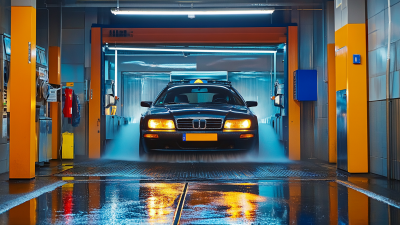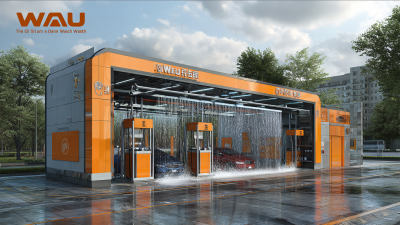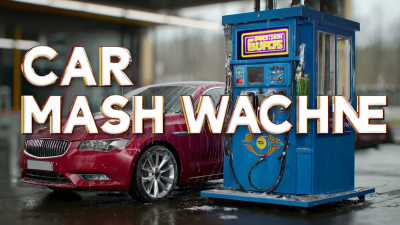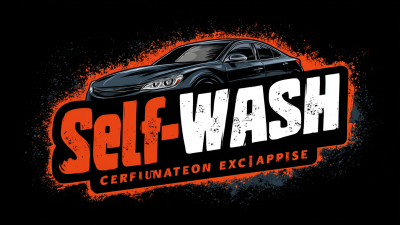How to Choose the Best Car Wash Machine Equipment for Your Business Needs
In today's automotive service industry, investing in the right Car Wash Machine Equipment is paramount for businesses aiming to deliver exceptional customer satisfaction while optimizing operational efficiency. According to a report by IBISWorld, the car wash industry in the United States generates around $11 billion in revenue annually, reflecting a growing consumer demand for convenient and high-quality car care services. With the increasing trend towards eco-friendly solutions and advanced technological innovations, choosing the appropriate car wash system can greatly impact profitability and market competitiveness.

By carefully evaluating factors such as capacity, energy efficiency, and water usage, business owners can position themselves strategically in a rapidly evolving market. This blog will guide you through the essential considerations for selecting the best car wash machine equipment tailored to your unique business needs.
Essential Factors to Consider When Selecting Car Wash Machines for Your Business
When selecting the right car wash machine for your business, several essential factors must be considered to ensure you meet both your operational needs and customer expectations. First, assess the type of car wash service you intend to offer—whether it’s a touchless system, a friction wash, or a tunnel wash. Each system has its unique advantages and limitations. A touchless wash may use less water and be gentler on vehicles, while friction systems can provide a more thorough clean. Understanding your target market and their preferences will help you make an informed decision.
Additionally, consider the machine's capacity and maintenance requirements. If you anticipate a high volume of customers, investing in a machine that can handle increased traffic efficiently is crucial. Maintenance also plays a significant role in the longevity and reliability of your equipment; choose machines with accessible and affordable upkeep. Furthermore, evaluate the technology and features available, such as water recycling systems and payment processing options, which can enhance the customer experience and contribute to operational efficiency. By weighing these factors carefully, you can select a car wash machine that aligns with your business goals and maximizes profitability.
Comparing Different Types of Car Wash Equipment: Pros and Cons
 When selecting car wash equipment, it's essential to understand the various types available on the market, each featuring distinct advantages and disadvantages. For instance, automatic car wash systems are popular for their efficiency and high-throughput capabilities. These systems can handle multiple vehicles in a short period, making them ideal for busy operators. However, the initial investment can be substantial, and maintenance costs might add up over time. Businesses also need to consider the space required for installation and the potential challenges in adapting these systems to different vehicle types.
When selecting car wash equipment, it's essential to understand the various types available on the market, each featuring distinct advantages and disadvantages. For instance, automatic car wash systems are popular for their efficiency and high-throughput capabilities. These systems can handle multiple vehicles in a short period, making them ideal for busy operators. However, the initial investment can be substantial, and maintenance costs might add up over time. Businesses also need to consider the space required for installation and the potential challenges in adapting these systems to different vehicle types.
On the other hand, self-service car wash equipment offers a more flexible, cost-effective solution for smaller businesses or those situated in areas with lower traffic volumes. Customers appreciate the ability to clean their vehicles at their own pace, which can enhance customer satisfaction. However, the downside includes the need for regular upkeep and potential seasonal fluctuations in usage. Additionally, businesses may need to manage and monitor operations more closely to ensure a clean and functional environment. By weighing these pros and cons carefully, business owners can make informed decisions that align with their financial and operational goals.
Top Features to Look for in Commercial Car Wash Systems
When selecting commercial car wash systems, understanding the top features that cater to business needs is crucial. According to IBISWorld, the car wash industry has seen annual growth of 3.4% over the past five years, emphasizing the increasing demand for efficient and versatile equipment. A feature that stands out is the technology integrated within the machines. Systems with software that offers progress tracking and automated payment options can enhance operational efficiency and improve customer satisfaction.
Another essential aspect is water and energy efficiency. A report from the Environmental Protection Agency (EPA) suggests that modern car wash machines can save up to 80% more water than traditional hand-washing methods. Opting for machines with eco-friendly certifications not only reduces operating costs but also appeals to environmentally conscious consumers.
**Tip:** When assessing equipment, consider investing in systems that allow for quick upgrades. Many brands offer modular options that can be tailored to your business needs as they evolve, ensuring long-term value and adaptability in this competitive market. Additionally, always look for warranties and service agreements that offer ample support, as this can significantly reduce maintenance costs and downtime.
Top Features to Look for in Commercial Car Wash Systems
Budgeting for Car Wash Equipment: Investment vs. Long-term Savings
When considering the purchase of car wash equipment, budgeting plays a crucial role in determining whether you're making a sound investment or simply incurring higher long-term costs. According to a 2022 IBISWorld report, the car wash industry generates over $11 billion annually in the United States, highlighting the significant returns possible with the right machinery. Investing in high-efficiency car wash systems can reduce water consumption by up to 60%, translating to substantial cost savings on utility bills. Moreover, eco-friendly equipment can enhance your business's appeal to environmentally conscious consumers, potentially increasing customer retention.
Evaluating the initial cost of car wash machines is essential; however, it's equally important to consider factors such as maintenance, longevity, and operational efficiency. A report from the International Carwash Association notes that establishments that invest in advanced technology typically see a 20-30% decrease in labor costs. In the long run, prioritizing modern, durable equipment may yield better performance and lower operating expenses, ultimately improving your bottom line. By carefully planning your budget and understanding the financial implications of your choices, you can ensure that your investment in car wash equipment pays off for years to come.
How to Choose the Best Car Wash Machine Equipment for Your Business Needs - Budgeting for Car Wash Equipment: Investment vs. Long-term Savings
| Equipment Type | Initial Investment ($) | Maintenance Cost per Year ($) | Estimated Lifespan (Years) | Potential Revenue per Year ($) | Long-term Savings ($) |
|---|---|---|---|---|---|
| Automatic Car Wash | 50,000 | 5,000 | 10 | 75,000 | 20,000 |
| Self-Service Car Wash | 30,000 | 3,000 | 8 | 50,000 | 10,000 |
| Mobile Car Wash | 15,000 | 1,500 | 5 | 40,000 | 7,500 |
| Detailing Equipment | 10,000 | 1,000 | 6 | 30,000 | 3,000 |
| Foam Cannon | 5,000 | 500 | 3 | 15,000 | 1,000 |
Understanding Maintenance Requirements for Car Wash Machines
When selecting car wash machine equipment for your business, understanding the maintenance requirements is crucial for ensuring longevity and efficient operation. According to a 2022 report by IBISWorld, the car wash industry is projected to grow by 3.6% annually, highlighting the necessity for reliable equipment. Regular maintenance is essential, with studies indicating that preventive maintenance can reduce operational downtime by as much as 40%. This not only enhances customer satisfaction but also contributes to a higher return on investment.

Key maintenance tasks include regular inspections, cleaning filters, and checking fluid levels to prevent equipment failure. Specifically, conveyor systems and high-pressure washers require consistent attention to guarantee optimal performance, as neglecting these areas can lead to costly repairs. Additionally, implementing a scheduled maintenance program can help minimize wear and ensure compliance with industry standards.
According to industry experts, businesses that invest in routine maintenance average 15% higher efficiency rates, further emphasizing the importance of choosing machines that facilitate easy upkeep.
Related Posts
-

Ultimate Guide to Choosing the Best Automatic Car Wash Equipment for Your Business
-

Unmatched Quality: China’s Top Drive Through Car Wash Machines for Global Buyers
-

5 Essential Tips to Optimize Your Machine Car Wash Business for Global Buyers
-

7 Essential Features of the Best Car Wash Machine for Business Success
-

Navigating Industry Standards and Challenges in the Best Car Wash Machine Production
-

How to Navigate Import and Export Certifications for the Best Self Wash Car Wash Equipment